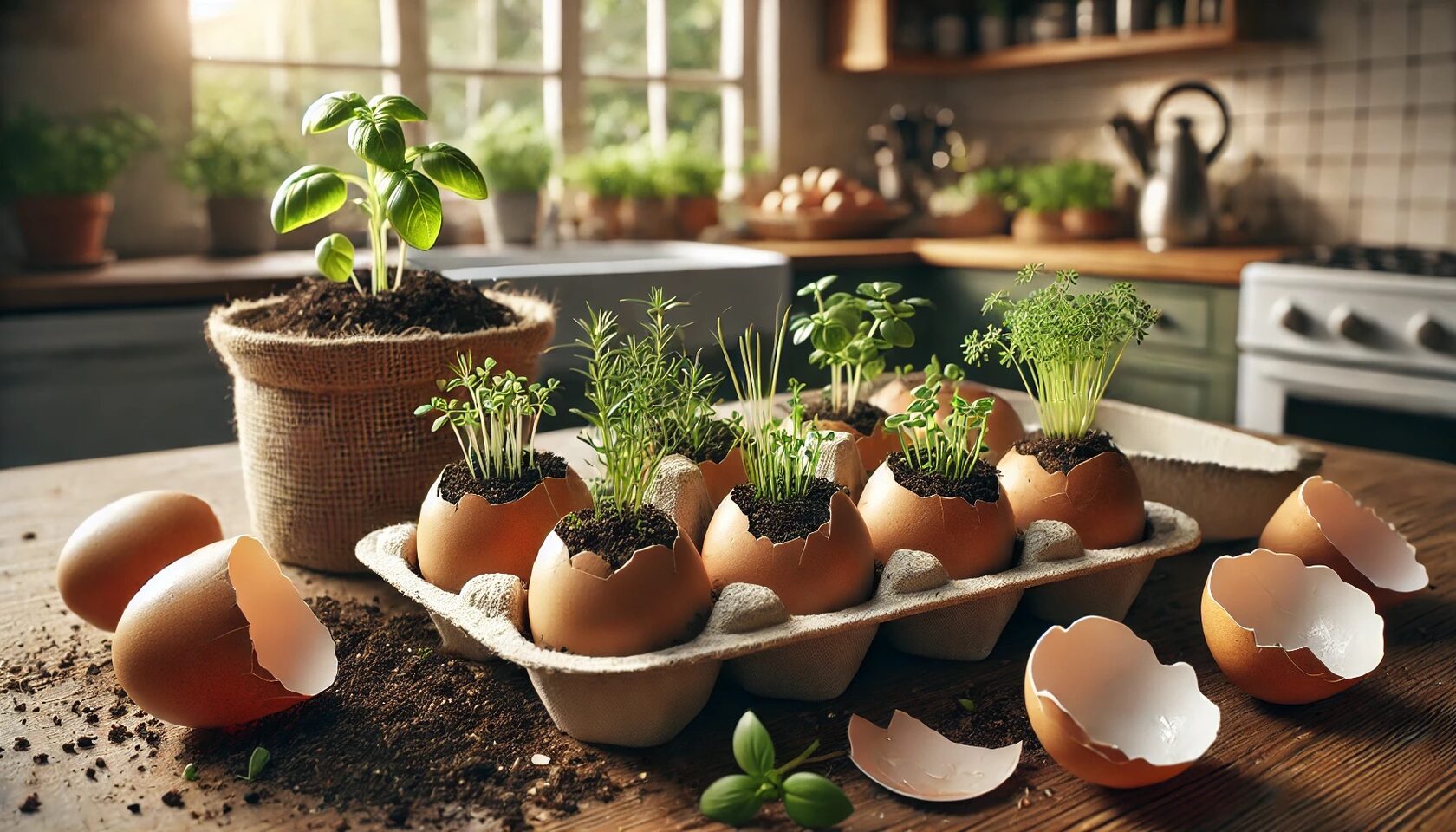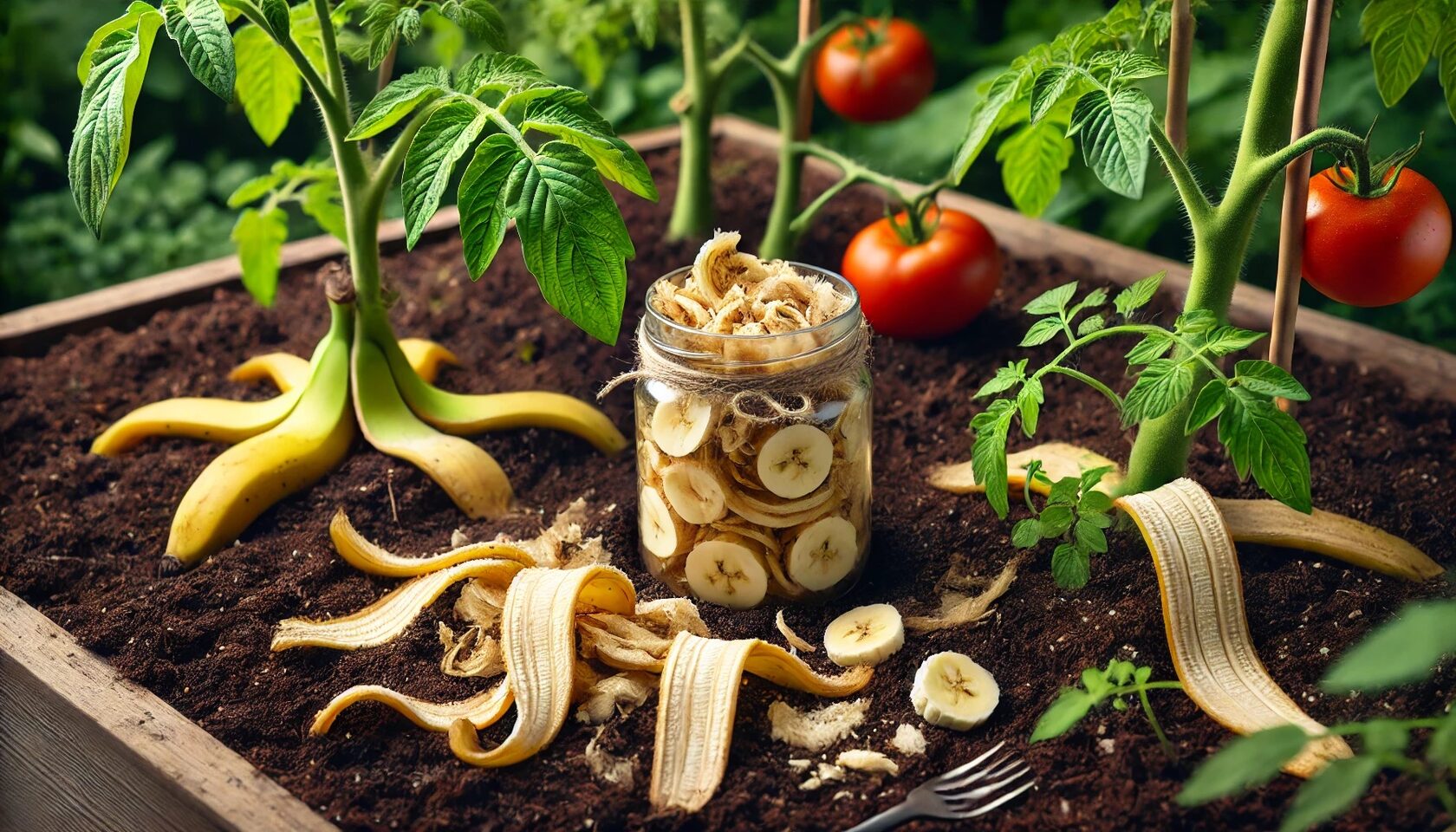We all know that gardening is a labor of love, but it can eat up hours of your day if you're not careful. These smart tricks can help you enjoy more time admiring your garden, without all the heavy lifting. Plus, you’ll learn a few eco-friendly ways to reuse everyday items and reduce waste. Let’s dive in!

Picture is generated by AI
1. Eggshell Seed Starters: Grow Green and Strong
Instead of buying seedling pots, why not try using eggshells as mini containers for starting your plants? This zero-cost hack lets you recycle something you’d otherwise throw away, and it helps your plants too! Eggshells decompose in the soil, slowly releasing calcium that strengthens plant roots and stems.
Why It Works: Eggshells contain calcium carbonate, which your plants need to develop strong cell walls. This extra calcium is especially helpful for tomatoes, peppers, and eggplants, which often suffer from calcium deficiencies.
How to Use It: After using the eggs, rinse out the shells and let them dry. Once dry, fill the shells with soil, plant your seeds, and place them in a sunny spot. When your seedlings are ready, plant the whole shell in the garden—it’ll break down naturally, enriching the soil as it goes.
Personal Tip: Add a small hole at the bottom of the shell for drainage. This helps avoid waterlogging, giving your seedlings the best start!
2. DIY Watering Jug: A Quick and Eco-Friendly Fix
When you’re in a pinch and don’t have a watering can, an old plastic jug can save the day. It’s an excellent way to recycle something you’d otherwise toss out, and it’s just as effective as any store-bought tool.
Why It Works: By poking a few small holes in the cap, you create a slow, gentle stream of water that hydrates plants without disturbing the soil or overwatering. It’s especially useful for delicate seedlings or indoor plants.
Pro Tip: Have different-sized jugs on hand for various plants. Larger plants may need a bigger jug to ensure deeper watering. You’re not just recycling plastic—you’re customizing your watering for each plant’s needs!
3. Coffee Grounds for a Healthy Soil Boost
If you’re a coffee drinker, you’re in luck! Your plants can benefit from your coffee habit too. Coffee grounds are rich in nitrogen, which helps improve soil structure and encourages strong, leafy growth.
Why It Works: Nitrogen is essential for plant growth, especially for foliage-heavy plants. The grounds improve soil aeration and water retention, plus they attract worms that help break down organic matter, creating healthier soil over time.
Personal Touch: I’ve found that sprinkling a small amount of coffee grounds around my roses and tomatoes every few weeks gives them a noticeable boost. Be careful not to overdo it, though—too much can make the soil too acidic.
4. Banana Peel Fertilizer: Sweet for Your Garden
Banana peels are an incredible source of potassium, and they decompose naturally, releasing nutrients that help strengthen plant roots and promote blooming.

Picture is generated by AI
Why It Works: Potassium regulates water flow within the plant, ensuring stronger roots and improved resistance to drought. It also promotes flowering and fruit production, making this trick perfect for fruit trees, flowering plants, and vegetables like cucumbers and tomatoes.
How to Use It: Bury peels near your plant roots, or create a natural fertilizer by steeping them in water for a few days. Your plants will thank you for the extra nutrients!
Fun Tip: Try chopping the peels into small pieces before adding them to your compost. This speeds up the decomposition process, releasing nutrients faster!
5. Sponges for Better Pot Drainage: Keep Plants Hydrated
Ever notice your potted plants drying out too quickly? A sponge at the bottom of your pot can help! It acts as a moisture reservoir, soaking up excess water and slowly releasing it back to the roots.
Why It Works: In hot climates or during dry spells, soil in pots can dry out rapidly. The sponge keeps the soil moist for longer, giving your plants consistent hydration.
My Experience: I’ve found this trick particularly useful when I’m out of town for a few days. It helps prevent my container plants from drying out, even when I can’t water them daily.
6. Plastic Forks as Critter Protection: Keep the Pests Out
Sometimes, keeping critters like squirrels and rabbits away from your garden can be as simple as using plastic forks. Stick them into the soil with the prongs facing up, and they’ll act as a barrier to unwanted visitors.
Why It Works: Animals dislike sharp objects in the soil, so they’re less likely to dig around your plants when they encounter the forks.
Eco-Friendly Tip: Reuse old plastic forks instead of throwing them away. This hack not only protects your plants but also helps reduce waste!
7. Epsom Salt for a Garden Boost: Healthy Plants All Year
Epsom salt is a great way to give your garden a nutrient boost. It provides magnesium and sulfur, which help plants grow more vibrant flowers and develop stronger roots
Why It Works: Magnesium is crucial for photosynthesis, the process plants use to make food from sunlight. By adding Epsom salt, you’re ensuring your plants have the nutrients they need to thrive.
Personal Tip: I add Epsom salt to my watering routine for tomatoes and roses once a month. It’s a simple way to keep them looking lush and healthy!
8. Slow Watering with a Bottle: Watering Made Easy
Need a low-maintenance watering system? Try using an empty plastic bottle. Poke small holes in it, bury it near the roots of your plant, and fill it with water. The slow release will keep the soil consistently moist.
Why It Works: The bottle slowly releases water into the soil, providing consistent hydration and preventing water stress.
Personal Tip: This hack has been a lifesaver for my indoor plants, especially when I’m away for a few days. I use clear bottles, so I can see when the water is running low.
9. Citrus Peels for Seedlings: Eco-Friendly Pots
You can turn leftover citrus peels into biodegradable seedling pots. They’re natural, eco-friendly, and they add nutrients to the soil as they decompose.
Why It Works: Citrus peels naturally break down and enrich the soil with essential nutrients, like nitrogen and phosphorus.
My Experience: I’ve used orange peels for starting herb seeds, and it’s amazing to see them grow strong before transplanting the whole peel into the garden.
10. Wine Bottle Watering System: Simple Self-Watering
Don’t throw away empty wine bottles! Turn them into self-watering devices for your plants. Fill the bottle with water, turn it upside down, and push it into the soil.
Why It Works: The slow drip from the bottle ensures your plants get a steady supply of water without overwatering.
Personal Tip: I use this system for my indoor plants when I’m on vacation—it keeps the soil perfectly moist for days.
Bonus Tip: Use a Garden Planner for Maximum Efficiency
Using a garden planner can help you organize your planting schedule and ensure everything in your garden is in the right place. The easyDacha app simplifies this process, giving personalized advice on what to plant and when, as well as offering a 3D Garden Planner for tracking growth and planning layouts.
Why use a garden planner? It saves time, reduces mistakes, and ensures that you’re maximizing space and resources in your garden.
Benefits for beginners and pros: Whether you’re just starting out or have years of experience, a garden planner helps improve both productivity and efficiency.
Why this works: A well-organized garden maximizes growing potential by ensuring that plants are spaced correctly, watered efficiently, and planted at the right time, reducing resource waste and improving yields.
Personal Tip: The easyDacha app has been my go-to tool for garden planning. It helps me map out my garden and keep track of each plant’s growth.
Join our PRE-LAUNCH LIST to be the first to try out our app, designed for beginners and pros alike. Happy gardening!